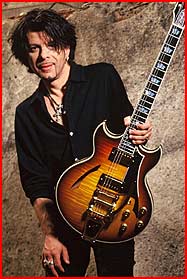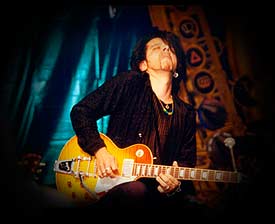
|
||
| Volume III, Issue I | Spring 2004 | |
| Spring 2004 Home Page |
| Culture, Politics & Technology |
| Fiction |
| Music |
| Poetry |
| Theater |
| About / Contact |
| Archive |
| Current Home Page |
Johnny A.: It's about the music
Talking to Johnny A. on the phone is a lot like listening to him play guitar: Thoughts and passions come tumbling out faster than you can possibly take them in, but always within a sense of structure.
And those ideas themselves are as distinctive as his instrumental approach to pop music is in today's musical landscape. Talking to Johnny A., you hear a lot about responsibility – to the fans, to the music.
"As much as I want to be an accomplished guitar player and be the best I can be as an instrumentalist, I also think my responsibility is to write songs the best I can and arrange songs the best I can. That's my responsibility as an artist."
 The Boston-based guitarist has had a busy couple of years since his first solo album, "Sometime Tuesday Morning," was self-released and ended up getting more radio airplay than most heavily promoted big-studio efforts. That earned him a deal with Steve Vai's Favored Nations label. His new album, "Get
Inside," came out in February, and is already tearing up the AAA radio format.
The Boston-based guitarist has had a busy couple of years since his first solo album, "Sometime Tuesday Morning," was self-released and ended up getting more radio airplay than most heavily promoted big-studio efforts. That earned him a deal with Steve Vai's Favored Nations label. His new album, "Get
Inside," came out in February, and is already tearing up the AAA radio format.
While the media's focus on Johnny A.'s success has been on the fact that it has come in his middle years, after several decades playing guitar in local bands and backing former J. Geils frontman Peter Wolf, none of that seems to faze him. In 30 minutes of listening to Johnny A. talk about his music and career, there wasn't one word about his recent success.
Instead, a more typical thought from the rapid-fire mind of Johnny A. might be this:
"Any of the great, lasting artists had great versatility – the Beatles could go from 'Love me Do' to 'I am the Walrus' and still sound like the Beatles."
Another favorite theme, one which he turns to even in the middle of a seemingly unrelated exposition, is the playing of the guitarists who have inspired him. Names like Wes Montgomery, Pat Martino and Kenny Burrell will be immediately familiar to jazzheads. The rockers will dig his odes to Jeff Beck, Eric Clapton, Jimi Hendrix, the Ventures and George Harrison. Country fans can appreciate the nod to Chet Atkins.
"I never tried to learn their solos. I was inspired by them. Always curious and intrigued about why these guys had a special quality about them. What makes them better than the next guy. Not necessarily a chops thing. This other guy is playing just as fast, just as intricate, but I'm not feeling it."
He also expands his list of influences to anyone he considers to have made great art – citing Frank Sinatra and Ella Fitzgerald in particular, but also soul singer Al Green, big band leader Jimmy Dorsey, jazz drummer Gene Krupa and the Everly Brothers.
But after reeling off a half-dozen or so from the above disparate list, Johnny A. laughs as if realizing the incongruity of it all, and says, "I think that's why my style is so varied – I like a lot of musicalities, and have a short attention span!"
 Courtesy JohnnyA.com |
That first record "Was purely for myself," he said. "Out of survival, and I said If I'm going to do this, I'm going to do it with no compromises.
"It was a celebration of influences, and I worked hard at creating a tangible voice out of my guitar."
That decision not to sing or have a singer is what sets Johnny A.'s music apart from the pack in the current musical landscape, a fact he acknowledges.
"A lot of instrumental music is pawned off as novelty if it's not jazz or blues. A lot of pop music that's instrumental has gone to either a shredding thing or a novelty thing. Which is all cool, but my thing is I want to do good songs and I want to do them in a spirit of 'if I was a vocalist.'
"I knew I didn't want to do a shredding kind of thing, because there are so many great players who do. Beck, Satriana, Vai, Eric Johnson. And they're great. So, to me, it's been done and even if I did it as good as them, would it even make a difference? And honestly, I'm not excited by that – I appreciate it and dig it, but it's not what gets me off. What gets me off is songs.
If there is anything that the exuberant Mr. A. doesn't like, it's fixation on his age as success finally finds him.
"That's kind of a pet peeve of mine – this age thing.
"In every other pot of art – whether you're a painter or a classical musician, a jazz musician, poet, writer, director, it seems you get respect with age. With contemporary pop or rock music, it works against you.
"I think it ought to be you just judge poeple on whether they have something to offer. If one is playing their instrument and continuing to write great music and produce great music, I don't think age should work against them."
If there's something vital and real there, it should just be accepted."
![]()
Spring 2004 Music Section | Spring 2004 Main Page
Current Music Section | Current Home Page
Copyright ©
Reprinted by permission of author, who retains all copyright and control.